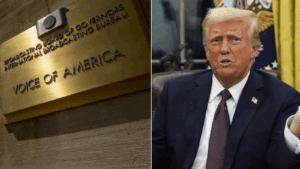States including Washington, Colorado, and California are contesting the Trump administration's decision to halt funding for electric-vehicle charging stations, which they say undermines critical infrastructure developments.
States Take Legal Action Against Trump Administration Over Electric Vehicle Funding Freeze

States Take Legal Action Against Trump Administration Over Electric Vehicle Funding Freeze
A coalition of states files a lawsuit as federal funds for electric vehicle infrastructure remain frozen.
In an escalating legal battle, a coalition of states led by Washington, Colorado, and California filed a lawsuit against the Trump administration on Wednesday, accusing it of unlawfully withholding billions allocated by Congress for electric-vehicle charging infrastructure. This lawsuit, presented in the U.S. District Court for the Western District of Washington, argues that the federal government has enacted a freeze on essential funds stemming from the 2021 bipartisan infrastructure law, which designated $5 billion to support the development of charging stations nationwide.
To date, just 71 stations have been constructed according to the research firm Atlas Public Policy, with many more projects in various stages of planning. The lawsuit claims that this freezing of funds and the cessation of approvals for new stations is detrimental to both state economies and the expanding electric-vehicle market.
The timing of the lawsuit coincides with the White House's recent budget proposal, which recommended canceling funding for certain electric-vehicle charger grant programs. President Trump had previously critiqued these initiatives through an executive order, and further directives from the Transportation Department reinforced the administration's intent to prioritize other energy sources. However, the lawsuit contends that comprehensive funding reductions necessitate Congressional consent, a step the administration has not taken.
Attorney General Rob Bonta of California voiced strong opposition to the actions of the Trump administration, claiming the president's maneuvers illustrate a constitutional overreach. He stated, “This is an unlawful attempt to rob critical resources necessary for developing electric vehicle charging infrastructure, all in favor of interests that cater to Big Oil.”
In California alone, nearly two million zero-emission vehicles have been sold, amounting to one-third of the national total. The state anticipated receiving approximately $384 million from federal assistance to bolster its network of charging stations, a dependence that the lawsuit highlights amidst claims of federal interference.
To date, just 71 stations have been constructed according to the research firm Atlas Public Policy, with many more projects in various stages of planning. The lawsuit claims that this freezing of funds and the cessation of approvals for new stations is detrimental to both state economies and the expanding electric-vehicle market.
The timing of the lawsuit coincides with the White House's recent budget proposal, which recommended canceling funding for certain electric-vehicle charger grant programs. President Trump had previously critiqued these initiatives through an executive order, and further directives from the Transportation Department reinforced the administration's intent to prioritize other energy sources. However, the lawsuit contends that comprehensive funding reductions necessitate Congressional consent, a step the administration has not taken.
Attorney General Rob Bonta of California voiced strong opposition to the actions of the Trump administration, claiming the president's maneuvers illustrate a constitutional overreach. He stated, “This is an unlawful attempt to rob critical resources necessary for developing electric vehicle charging infrastructure, all in favor of interests that cater to Big Oil.”
In California alone, nearly two million zero-emission vehicles have been sold, amounting to one-third of the national total. The state anticipated receiving approximately $384 million from federal assistance to bolster its network of charging stations, a dependence that the lawsuit highlights amidst claims of federal interference.





















